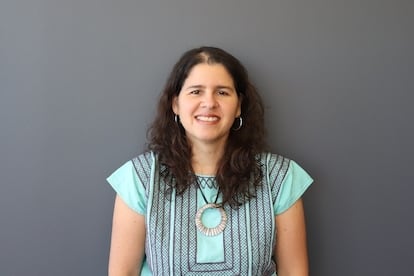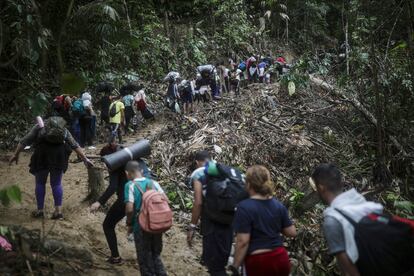Carolina Jiménez: ‘Nayib Bukele is an aspiring authoritarian on steroids’
Born in Venezuela, she is the first Latin American woman to head the Washington-based human rights advocacy group WOLA. In this interview, she talks about democratic backsliding in the region

Carolina Jiménez Sandoval was the first woman in her family to go to university. In her native Acarigua, Venezuela, she took her grandmother’s advice to heart. It motivated her to study and she went not only to Caracas but also to the United States and Japan, and she has never looked back. Today, she is the first Latin American woman to be named president of the Washington Office on Latin America (WOLA), where she provides a voice for women within the well-known research and advocacy organization advancing human rights in the Americas.
At 50 years old, she knows what it is like to live in countries like Nicaragua, Colombia, and Mexico, where she has worked. Jiménez says that at the center of her work is the fight against forgetting. “Milan Kundera says that ‘the struggle of man against power is the struggle of memory against forgetting.’ That is the game authoritarians are playing when they try to make us forget what they have done,” she says in conversation with EL PAÍS.
Question. There is a feeling that these are dark times for democracy in Latin America. Do you see it this way compared to other times, even during the dictatorships in the region?
Answer. It is a very dark time, but there are still some lights. On the one hand, there is a democratic regression that suffocates us: deeply entrenched authoritarianism like we see in Venezuela and Nicaragua; others that are moving at an impressive speed, such as El Salvador with Nayib Bukele, who in a single presidential term managed to dismantle the rule of law and move to a security model that clearly violates human rights, but which is very popular. Then, you have elections like Javier Milei’s in Argentina and the democratic deterioration of Peru; and there have been attacks on journalism in Mexico.
Q. Why is this decline happening?
A. The democratic backsliding in the region is very clear. With very few exceptions, we see a retreat from the promise we once had about a democratic Latin America after military dictatorships and civil wars. This is also accompanied by a certain disenchantment with democracy on the part of the people.
Q. Why do you think they are disenchanted?
A. Data from the main regional polls such as Barómetro evidence this. In 2010, people in Latin America were asked: “Do you believe that democracy is the main model of government that you prefer over others?” At that time, 63% said yes. In 2023, when faced with that same question, only 48% responded affirmatively. The crisis of democracy is also epistemological, it is one of citizen disenchantment with a system that promised them many things and gave them little. So, yes, it is a very dark time. It reminds us of times when there was no democracy and an enormous restriction on our rights.
Q. Where is the light in these dark times?
A. Latin America is not a region where we have remained silent. While the region is experiencing many types of violence, it does not have an active interstate armed conflict. Furthermore, although it is a conservative region, it has achieved rights victories such as those won in Argentina and Colombia by the feminist movement. Latin American youth no longer believe in institutions, in their congresses and presidents, but they believe in their causes, such as the fight for the environment, gender equality, and social justice. Furthermore, this is still a region where civil society is very strong.
Q. With all these asymmetries, what do you see as the biggest cause for concern?
A. There are differences due to contexts and political history, but there are regional patterns. Democratic setbacks bring with them old ghosts such as threats to freedom of the press, freedom of association, forced disappearances and political pressures; all of this is alarming. Latin America is still the most unequal continent in the world, with an enormous debt in environmental matters, which is reflected in the attacks against the countries’ leaders. The violence brought by organized crime is also a fairly deep-rooted regional phenomenon; some Latin American countries are still the main producers of illicit drugs, which was previously cocaine and is now fentanyl. And in the framework of a totally anachronistic and prohibitionist drug policy, the region continues to see a rising death toll. The states are failing to contain the violence that is now transnational, and they haven’t managed to propose an alternative to the violence.
Q. Is violence against women another pattern?
A. Yes, and with a huge component of very serious impunity. Authoritarianism is patriarchal. The United States, for example, which was one of the first countries to legalize access to abortion, now faces the prospect of a 50-year setback under a far-right authoritarian; then you have Argentina, where Javier Milei has the same theme in his narrative. And then there are the leaders who are supposed to be progressive and are not feminists at all. Venezuela has had 25 years of Bolivarian revolution and there is no civil union; in Bolivia the measure is only a few years old; and in Mexico, where the president has never promoted laws in favor of LGBTQ+ right or sexual and reproductive rights, everything has been achieved through victories in court, as in Colombia. The leaders of the region, regardless of [their political affiliation], are quite conservative. Authoritarianism is closely linked to the setbacks in women’s rights.
Q. Is it confined only to the region?
A. Democratic backsliding is global. Not only in China and India, with their huge populations, but also in Europe where there are clear advances by far-right groups, such as those in Hungary and Italy. Authoritarianism transcends ideology. Let’s look at the case of Vladimir Putin. He is a misogynist and militarist with zero tolerance for political dissidence. [There’s also] Bukele, who is also right-wing but has enormous alliances with the Honduran and Nicaraguan governments.
Q. Why has Bukele’s rise been so fast?
A. He is a very effective communicator and has great control over the use of narratives. I define him as an aspiring authoritarian on steroids. This is due to the speed of his rise, which is understandable in the regional context of the criminal violence that affects people’s daily lives. There is no denying it, the gangs in El Salvador controlled both towns and the countryside and the Salvadoran society was exhausted. Bukele came to power, like many, promising that he was going to change that situation. At the beginning, we now know, he tried unsuccessfully to negotiate with the gangs to lower the levels of violence. Then, in a new step towards co-opting the judicial power, he abruptly swapped out the attorney general and the court justices, and decided to try another strategy besides mass arrests, leading to a state of exception that became permanent.
Q. It’s a model that some are already interested in exporting.
A. There is concern about the belief that these models can be replicated and sustained. They are not, and the example is Ecuador. We are already hearing about the Bukele model, although it is not clear what that means. However, as there have been successes, Bukele is gaining enormous popularity and that has led to him being able to continue co-opting institutions to the point where he says: ‘The people are asking for it, I should re-elect myself.’ When a country loses its judicial independence — which is something that has been seen throughout the region — it also loses the checks and balances on the government.
Q. There are, however, other countries with deeply rooted authoritarianism, such as Venezuela. Why is this authoritarianism deepening?
A. The latest events, such as the forced disappearance and detention of Rocío Sanmiguel, the High Commissioner for Human Rights’ departure from office, and the disqualification of opposition candidates, are symptoms of a repressive surge that violates international standards of human rights and the spirit of the Barbados Agreement. The government has been repressive for years, in fact, it is the only country in the Americas under investigation by the International Criminal Court for crimes against humanity. The strategy of repression is not new, but this is an election year that puts the permanence of Nicolás Maduro’s government up against the ropes because it is tremendously unpopular and because the opposition managed to hold primary elections.
Q. Daniel Ortega has exiled intellectuals and he has taken away their citizenship. Could he increase the repression even further?
A. People in Nicaragua tell us that there’s always something else that can happen. When you think about it, what else will they do if they already have absolute control over the country? The regime has basically displaced civil society, closed universities, and now it is entering a phase of persecuting the Catholic Church by imprisoning or exiling priests. Not only has the International Red Cross been expelled but even the Boy Scouts have been outlawed. Ortega has also declared war on a beauty pageant, arresting and banishing the family of Miss Nicaragua. That is why it is important that this authoritarianism is not forgotten or normalized. It is not normal for there to be forced disappearances, arrests, or no alternation in power. When we normalize it, we abandon people.
Q. What does it mean for women that there are two women candidates for the presidency in Mexico?
A. Mexico is a country with very high levels of violence, and it is deeply scarred by organized crime and militarization. But the most interesting thing is that this year it will have the first female president in its history. It is very important at the level of representation, but what we want from women’s leadership is for them to exercise feminist, not feminine, leadership. For those of us who defend feminism from a point of view of equality, there cannot be militaristic feminism; that does not exist, since militarism is very patriarchal. We have not seen different law and order policies from the two main candidates, nor are there policies to track down the more than 100,000 missing people, or for tackling the control exercised by drug trafficking. We haven’t heard them talk much about women’s rights either. It is not an important part of their agenda.

Q. One of the themes they agree on has been migration. You recently asked Colombian President Gustavo Petro not to politicize it.
A. We are in a time of accelerated migration like we have not seen before. In Venezuela, there was a perfect storm leading to a human rights crisis. It is no coincidence that the first wave of migrants was after the 2014 protests, when Maduro began to become an authoritarian. The price of oil began to decrease and the recession arrived followed by years of tremendous scarcity. In January 2017, the Venezuelan Federation of Pharmacies issued a statement that the drug shortage rate was 85%. At that time, there were no financial sanctions. My complaint to President Petro is that, without any fact checking, he repeats what Maduro says day and night: ‘the only problem that Venezuela has is the blockade.’ I insist, the sanctions have deepened the problem, but that alone is not to blame for a complex phenomenon that affects the lives of millions of people. And it is worrying that the leader of a country that is the main recipient of the Venezuelan diaspora is saying it.
Q. And there is the humanitarian crisis in the Darién region.
A. What the United States is doing is externalizing its borders and promoting a regional containment system, and we see our countries cooperate efficiently by sending soldiers to the borders, instead of moving towards the creation of a regional protection system. It is quite disappointing to see governments working together to contain the migrants and yet have so many difficulties in providing protection. It is a huge problem for the entire continent.
Sign up for our weekly newsletter to get more English-language news coverage from EL PAÍS USA Edition
Tu suscripción se está usando en otro dispositivo
¿Quieres añadir otro usuario a tu suscripción?
Si continúas leyendo en este dispositivo, no se podrá leer en el otro.
FlechaTu suscripción se está usando en otro dispositivo y solo puedes acceder a EL PAÍS desde un dispositivo a la vez.
Si quieres compartir tu cuenta, cambia tu suscripción a la modalidad Premium, así podrás añadir otro usuario. Cada uno accederá con su propia cuenta de email, lo que os permitirá personalizar vuestra experiencia en EL PAÍS.
¿Tienes una suscripción de empresa? Accede aquí para contratar más cuentas.
En el caso de no saber quién está usando tu cuenta, te recomendamos cambiar tu contraseña aquí.
Si decides continuar compartiendo tu cuenta, este mensaje se mostrará en tu dispositivo y en el de la otra persona que está usando tu cuenta de forma indefinida, afectando a tu experiencia de lectura. Puedes consultar aquí los términos y condiciones de la suscripción digital.









































